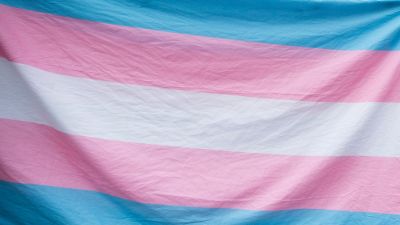Hate crime against transgender people doubles as offences reach record high

The number of hate crimes targeted at transgender people in England and Wales has risen by 56% , as overall offences hit a record high.
The number of offences that were recorded by police in 2021-22 was 155,841, the biggest annual jump since Brexit in in 2016.
Although fewer crimes motivated by transgender identity were recorded compared with other motivations, the group saw the biggest percentage rise.
The Home Office said transgender issues have been "heavily discussed on social media" over the last year, which may have led to an increase in related hate crimes.
Its report, published on Thursday, said: "It is uncertain to what degree the increase in police-recorded hate crime is a genuine rise or due to continued recording improvements and more victims having the confidence to report these crimes to the police."
Galop, an LGBT+ anti-abuse charity, said transphobic narratives in the media and by senior politicians have been allowed to grow without challenge and are translating into “violence against our community”.
She said hate crimes against LGBT+ people receive “far lower” sentencing lengths than other forms of hate crime and legislation proposed to make people safer, such as the ban on conversion therapy, is no longer proposing to cover trans people.
Leni Morris, chief executive of Galop, said: “Transphobic narratives in the media, and at a senior political level, have been allowed to grow unregulated, unchecked and unchallenged.
“That translates into violence against our community – particularly for trans, non-binary and gender non-conforming people.
“Let us be clear – there is a direct line between words and violent acts against our community, and always has been.”
“Combined with a growing hostile atmosphere for our community in the media and public life, this is giving a message to those who would do us harm that this is acceptable in this country,” she added.
Religious hate crimes rose to the highest level since records began in 2012 at 37%, hate crime related to sexual orientation increased by 41% and hate crimes towards disabled people increased by 43%. Some crimes are recorded as having more than one motivating factor.
The majority of hate crimes recorded by police were racially motivated - in line with previous years - and increased by 19% from the year ending 2021.
It is the first time the number of racially motivated hate crimes recorded over a year has topped 100,000.
The Home Office said the coronavirus pandemic provided a "suppressant effect" as lower levels of crime were recorded.
They also said hate crime was triggered in the short-term rise in recent years included Brexit in 2016, the terror attacks in 2017 and the Black Lives Matter protests and far-right counter-protests in summer 2020.
According to analysis of figures submitted by 26 forces to the Home Office, 9% of hate crime flagged offences had been dealt with by a charge or summons, slightly below 10% in year ending March 2021, 7% of violence against the person offences, flagged as hate crimes, were dealt with by a charge or summons, as were 5% of criminal damage and arson hate crime flagged offences.
Want a quick and expert briefing on the biggest news stories? Listen to our latest podcasts to find out What You Need To Know...
One in 10 public order offences flagged as hate crimes were dealt with by a charge or summons.
The Home Office said the most common outcome for violent offences was "evidential difficulties as the victim does not support action" (30%).
Data from all police forces shows that 8% of racially or religiously aggravated offences recorded by police resulted in a charge and or summons in the year ending March 2022. This is down from 12% in the previous year.
The Home Office said that evidence suggests a greater proportion of recorded crimes in recent years were for types of offence "which can be more challenging to investigate".